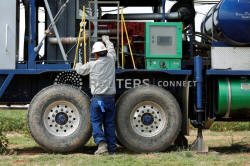'Broken system' starves U.S. oil boom of immigrant workers
 Send a link to a friend
Send a link to a friend
 [October 14, 2019] By
Andrew Hay [October 14, 2019] By
Andrew Hay
HOBBS, N.M. (Reuters) - New Mexico oil man
Johnny Vega laid out his predicament as his crew hoisted pipes from a
well during the biggest oil boom in U.S. history.
The son of a Mexican guestworker, Vega cannot find enough legal workers
to meet demand for his oil well service rigs.
There is no shortage of Hispanic and Latino immigrant workers without
work permits he could hire in Lea County, New Mexico - the No.2
oil-producing county in the United States.
But Vega says he wants to play by the rules, not least because of a
heightened risk of company audits by U.S. Immigration and Customs
Enforcement (ICE) under President Donald Trump. As a result, he has
equipment that could be generating $700,000 a month standing idle in his
yard.
"They're demanding more rigs, more swabbing units, but you don't have
enough employees," said Vega, who runs Mico Services with around $17
million in annual revenues. "It's a lack of a system to get legal
workers, to have more of a workforce to pull from."
Employers like Vega in the Permian Basin oilfields of New Mexico and
Texas say they feel caught between Trump's support for their industry
and his policies focused on tougher immigration enforcement.
It's a dilemma faced in other sectors of the U.S. economy that depend on
foreign workers after ICE reported surges of between 300% to 750% in
worksite investigations, audits and arrests in fiscal year 2018.

Visas for temporary jobs in sectors like agriculture and hospitality
have increased during the Trump administration. Oil companies complain
of difficulties gaining work permits for immigrant oil workers, who do
not qualify for these temporary visas.
The Permian Basin, by far the most productive oil field in the United
States, has helped make the country a net exporter of oil. Its output
growth has recently slowed, but production is still at all time highs.
The number of rigs drilling for oil in New Mexico hit a record 115 in
early October and labor shortages are felt most keenly in service
companies like Vega's that help keep the oil flowing.
The Permian Basin is short 15,000 workers, with demand met by paying
overtime and shipping workers in and out, according to data from the
Permian Strategic Partnership alliance of 19 energy companies.
DANGEROUS JOBS
Thousands of immigrants, mainly from neighboring Mexico, have thronged
to the decade-long boom. They often fill the hardest and most dangerous
jobs few Americans want, such as using heavy equipment to lift oil well
tubing or lay pipeline.
For Bob Reid, immigrants provide a solution to labor shortages and a
chance for boom-bust oil towns like Hobbs, New Mexico to build a more
stable future.
"The problem is a broken system that's preventing them from coming in
legally in a way that allows them to pursue a path to citizenship," said
Reid, head of the JF Maddox Foundation, a Hobbs charity.
In Lea County, Hispanics and Latinos now account for as much as 70
percent of the population, compared with 40 percent 20 years ago, based
on county school enrollment and other data.
About two years ago, ICE stepped up operations in the Permian area,
according to Lea County employers.
"I know people, my peers, that have been hit by immigration audits, and
they were told, specifically, that the Permian Basin was targeted
because of the vast amount of workers that were coming here," said Finn
Smith, president of Hobbs-based Watson Hopper Inc.
[to top of second column] |

An oil field worker prepares a swabbing rig in a field in Seminole,
TX, U.S. September 19, 2019. REUTERS/Adria Malcolm

ICE did not respond to requests for comment on its Permian operations.
Two companies in Hobbs, the largest city in Lea County, were recently audited:
Mesa Well Services and paving contractor Ramirez & Sons, according to a person
with knowledge of the situation and a Ramirez & Sons official.
Mesa Well officials were not available for comment. Ramirez & Sons Senior
Superintendent David Gallegos said the company was paying around $40,000 in
legal fees to apply for work permits or U.S. citizenship on behalf of five of
the employees laid off after the audit.
"They're worth fighting for," said Gallegos, a Republican New Mexico state
representative, of the "long term" employees who had bought homes in the area.
ICE operations, and Trump's threats of raids, have left many immigrants in Lea
County fearful. Some bolt from job sites at rumors of ICE activity, said Maria
Romano of New Mexico-based immigrant rights group Somos Un Pueblo Unido.
More companies are using the government's E-Verify immigration background checks
to vet new hires, said Romano, whose organization helps immigrants get on a
pathway to citizenship.
'VERY DIFFICULT HERE'
"It's now getting very difficult here for anyone who isn't documented," said
Juan, an unemployed pipeline worker who immigrated to the United States
illegally 11 years ago. He asked that his last name not be used to protect his
identity.
About a third of all immigrants in New Mexico and Texas lack valid working
papers, according to a Pew Research Center study based on 2016 U.S. census data.
Hobbs Mayor Sam Cobb says he is frustrated by the failure of political leaders
at the national level to create a pathway to citizenship for immigrants he
generally finds hardworking and law abiding.
"The very people who have suffered from that are the people who are here growing
our community, adding to the economic welfare of the community," said Cobb, a
Democrat, sitting in his office surrounded by paintings of oil wells and
cowboys.
Yet plenty of employers in Lea County still hire undocumented workers.

"What we do is we don't ask," said Lorena, a Mexican immigrant whose family has
built up a small oil field services business. She estimated that more than 90%
of her employees were Mexican immigrants and that only 5% to 10% had genuine
working papers. Her last name was not used to protect her identity.
Vega's labor woes are pushing him to reorient his oil well service business
toward hiring out his equipment.
"We have to rely on some of these immigrants, in this neck of the woods, to
produce the workforce that we're needing," said Vega, who said he supports Trump
"100%" but wishes he would "tone down" his rhetoric against immigrants. "Why not
allow them to be documented?"
(Reporting By Andrew Hay in Hobbs, New Mexico; Additional reporting by Gary
McWilliams in Houston; Editing by Bill Tarrant and Daniel Wallis)
[© 2019 Thomson Reuters. All rights
reserved.] Copyright 2019 Reuters. All rights reserved. This material may not be published,
broadcast, rewritten or redistributed.
Thompson Reuters is solely responsible for this content. |